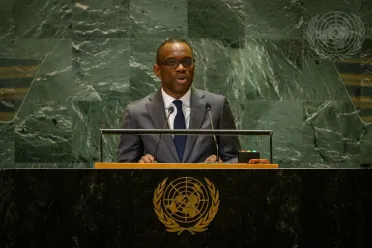Statement
Statement summary
OLUSHEGUN ADJADI BAKARI, Minister for Foreign Affairs of Benin, noted that although Africa is often far removed from the origin of global crises, it is nonetheless deeply affected. The Sahel region is the scene of growing tensions, exacerbated by decisions taken without the consent of Africans. This instability seriously compromises sustainable development; even more worrying, some external forces seek to import their geopolitical rivalries into the region. Such interference feeds the breeding ground for terrorism. He reaffirmed commitment to African unity, particularly in West Africa, with a historic responsibility to preserve the centuries-old brotherhood that unites those peoples. Further, he called on the international community to intensify efforts to restore stability through dialogue, whether in the Middle East, Ukraine, the Great Lakes region, Sudan, Libya or Haiti.
Despite such hotbeds of tension, he stressed: “We must never lose sight of another major challenge that threatens the future of our world — poverty in all its forms.” Five years before the 2030 deadline, it is painfully clear that the SDGs will not be achieved. “However, we must not give up the fight,” he stated, as Africa is the future of the world. In a few decades, the continent will be home to a quarter of humanity, with its young people and natural resources being an indispensable asset for the future of the planet. In 25 years, he asked, will the international community still be debating access to drinking water, electricity, health and education — or will every African live with dignity? Benin has initiated major reforms in education, health, or infrastructure and the international community must recognize these efforts and support African nations working for their future.
For Africa to take flight, he noted that it must also reconcile with its history. As it is impossible to grasp the essence of Africa without fully embracing its beliefs, traditions, and civilization, Benin — the motherland of Vodun culture — has taken the initiative to correct negative perceptions. However, respect for Africa does not stop at recognizing its past — it also involves a modern, action-oriented Pan-Africanism committed to reducing poverty and building a prosperous continent. Noting that it is impossible to advocate African unity when it is easier for a European to travel to Africa than for an African himself, he emphasized that Benin has made a bold choice by removing visas for all African nationals. Brothers and sisters in the diaspora, forcibly uprooted during the dark days of the transatlantic slave trade, must find their place within the African community. “We say to them: “Africa is your home, and we await you with open arms.” As 2024 marks the end of the International Decade for People of African Descent, he announced that Benin took a historic step by adopting a law granting Beninese nationality to all Afro-descendants who wish it.
Full statement
Read the full statement, in PDF format.
Photo

Previous sessions
Access the statements from previous sessions.
